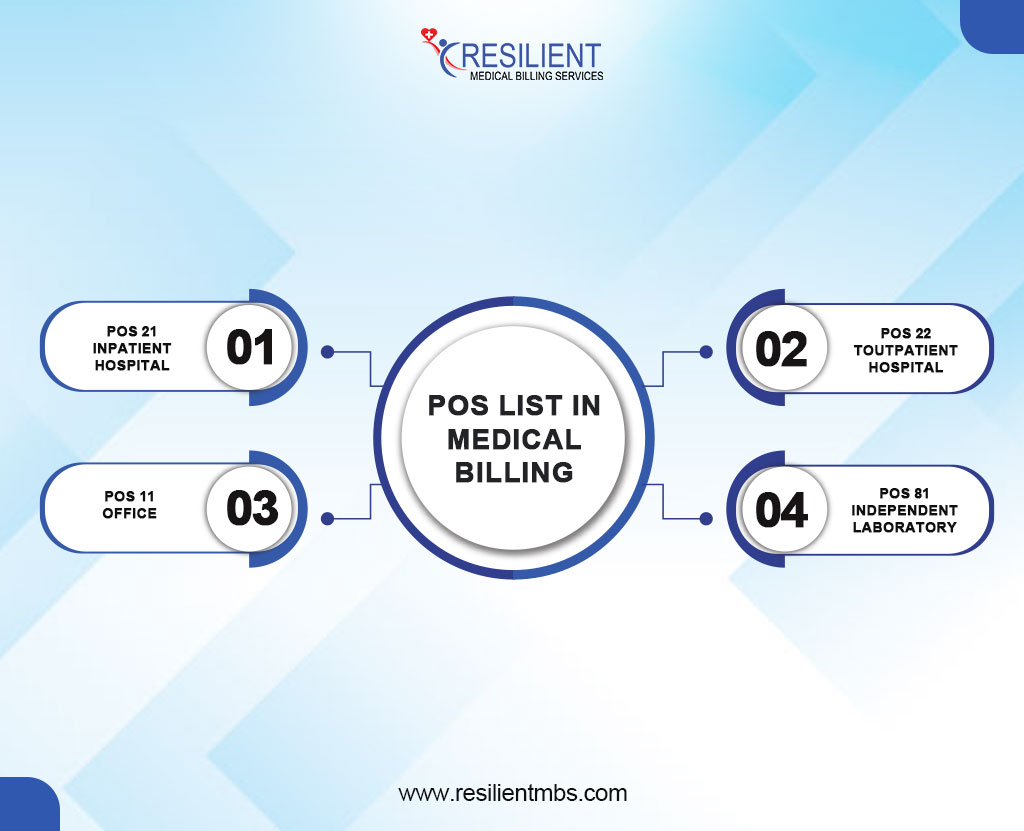In medical billing, doctors and healthcare providers use Place of Service (POS) codes to show where a service was given. These are two-digit numbers created by the Centers for Medicare & Medicaid Services (CMS), which help insurance companies determine how to process claims and pay providers accurately.
For laboratories, using the correct POS code is crucial. Since lab tests are often billed separately, the wrong code can lead to claim rejections, payment delays, or other issues.
One necessary code, POS 81 in medical billing, which is used only for independent laboratories. This makes it a key code for lab billing and getting claims approved without problems.
In this blog, we will discuss what means POS 81 in medical billing, why it matters in lab billing, how it compares to other POS codes, and the best practices for using it correctly.
What is POS 81 in Medical Billing?
POS 81 in Medical Billing is used for services provided by an Independent Laboratory. This means the tests are done in a lab that is not part of a doctor’s office, hospital, or outpatient clinic, but instead works as a separate facility.
For example, if your doctor orders blood work and sends your sample to a lab like Quest Diagnostics or LabCorp, the bill will use POS 81.
This code helps insurance companies know where the test was done. It also separates independent lab services from tests done in a hospital, whether outpatient (POS 22) or inpatient (POS 21). Using the correct code avoids claim denials and makes sure the lab gets paid correctly.
In simple terms, POS 81 is the code that tells insurance companies, “This test was done at an independent lab.”
Why POS 81 Matters in Lab Coding
Using POS 81 correctly in medical billing is very important for laboratories and healthcare providers. This code tells insurance companies that a test was done in an independent lab, not in a hospital or doctor’s office.
When the correct code is used, claims go through smoothly, and payments are made faster. If the wrong code is used, insurance companies may reject the claim, causing delays and extra work to resubmit it.
By consistently using POS 81 correctly, providers stay in line with insurance rules, avoid payment problems, and keep the billing process simple and reliable.
Understanding Place of Service (POS) Codes
Place of Service (POS) codes are special two-digit numbers used in medical billing to show where a healthcare service took place. These codes are created and updated by the Centers for Medicare & Medicaid Services (CMS) and are required on all insurance claims.

Why do they matter? Because the location of care, like a hospital, doctor’s office, or lab, can change how an insurance company processes the claim and how much is paid.
POS List in Medical Billing
- POS 21 – Inpatient Hospital: Care for patients staying in a hospital.
- POS 22 – Outpatient Hospital: Services done in a hospital’s outpatient department.
- POS 11 – Office: Services provided in a doctor’s office.
- POS 81 – Independent Laboratory: Tests performed in a lab that isn’t part of a hospital or doctor’s office.
By using the correct POS code, healthcare providers can make sure their claims are accurate, reduce mistakes, and get the proper payment from insurance companies.
Comparing POS 81 with Other Common POS Codes
In medical billing, choosing the correct Place of Service (POS) code is essential for accurate claim processing.
Common POS Codes:
POS 21 – Inpatient Hospital: Used when a patient is formally admitted and receives continuous care in a hospital.
POS 22 – Outpatient Hospital: Used for services provided at a hospital without admission, such as diagnostic tests or minor procedures.
POS 81 – Independent Laboratory: Used when lab tests are performed in a standalone facility, separate from hospitals or physician offices.
How POS 81 Differs
Unlike POS 21 and POS 22, which apply to hospital settings, POS 81 specifically identifies independent labs. This distinction is essential because reimbursement and payer rules vary depending on the POS code used.
Why Accuracy Matters
Using the wrong code can cause claim denials, payment delays, or compliance issues. For example, billing POS 22 instead of POS 81 for independent lab work may reduce or block reimbursement. Correct coding ensures compliance, fair payment, and transparency.
What is POS Entry Mode 81?
POS (Place of Service) Entry Mode 81 is a code used in medical billing to show that a test or service was done in an independent laboratory. These labs are not part of a hospital or doctor’s office; they run on their own and bill insurance directly.
This code is essential because it tells the insurance company where the service happened. For example, if your doctor orders a blood test but the sample is sent to an outside lab, that lab must bill using POS 81. If the wrong code is used, the insurance claim might be denied or delayed.
Best Practices for Using POS 81
- Double-check the location: Make sure the test was done in an independent lab before using POS 81.
- Follow insurance rules: Some insurance companies have special requirements, so only use POS 81 when it fits their guidelines.
- Use the latest list: CMS (Centers for Medicare & Medicaid Services) updates POS codes regularly. Staying current helps avoid mistakes.
These steps help billing teams get claims paid on time and prevent rejections.
Concluding Words
POS 81 is a key code for lab billing. Using it correctly makes claims smoother, reduces errors, and ensures faster payment. Staying updated with CMS rules helps keep billing accurate and compliant.
Want to learn more? Check the latest POS codes on the CMS website.
Need expert help with lab billing? Contact Resilient MBS. Our team can guide you, cut down on claim errors, and help you get reimbursed faster.
FAQS
What is POS 81 in medical billing?
POS 81 is a code used when lab tests are done in an independent laboratory, not inside a hospital or doctor’s office.
When should I use POS 81?
Use POS 81 for independent labs. Use POS 22 for tests done in an outpatient hospital and POS 21 for inpatient hospital services.
Why does POS 81 matter?
It tells the insurance company where the test was done. Using the correct code helps prevent claim rejections and payment delays.
Where can I see all the POS codes?
The complete list of place of service codes is published on the CMS (Medicare/Medicaid) website. It’s updated regularly.
What does POS entry mode 81 mean?
It simply shows that the service was entered as “Independent Laboratory” when the claim was filed.










